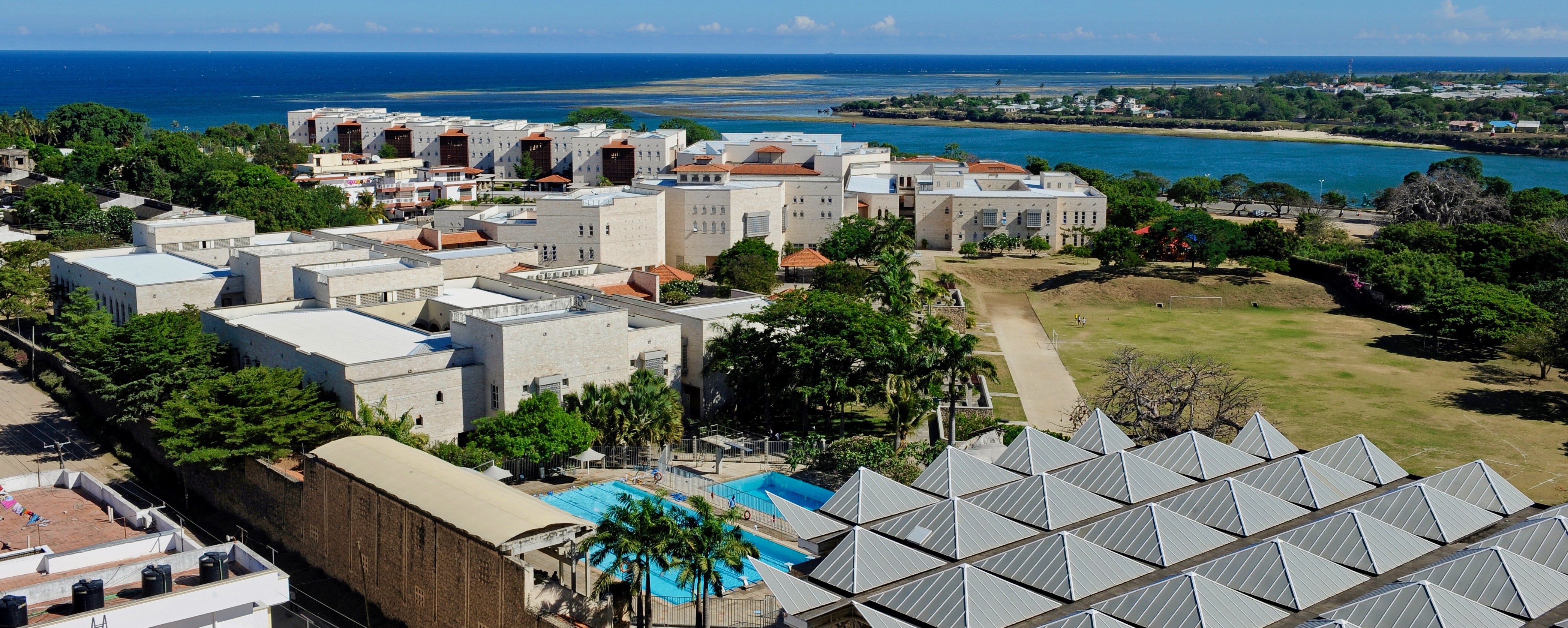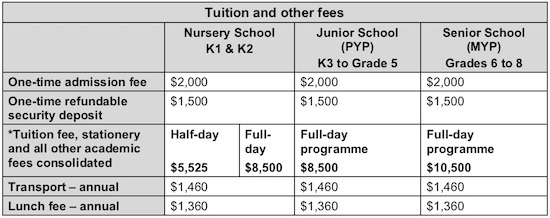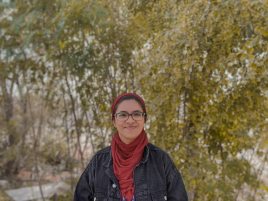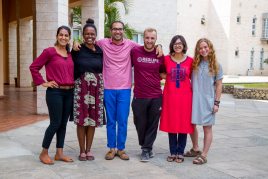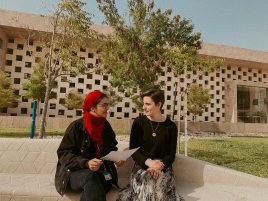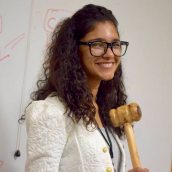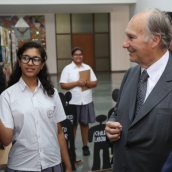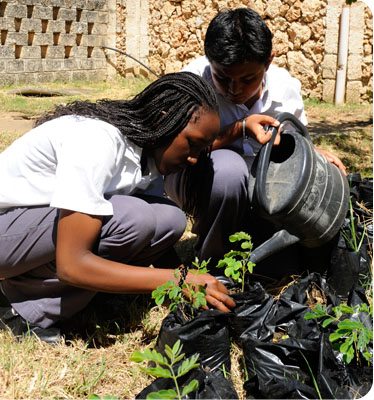On 24 May 2025, Aga Khan Academy Dhaka proudly celebrated the graduation of its inaugural cohort of International Baccalaureate Diploma Programme students in a distinguished ceremony.
Welcome to the Aga Khan Academy Mombasa
The Aga Khan Academy Mombasa has been awarded IB status by the International Baccalaureate
Multimedia
A better world through education: The Aga Khan Academies
View all Academies videos
Recent News
Niranjan Seena Suresh, a Diploma Programme 2 student, speaks to Pavan Kumar about how he evolved and grew alongside the Academy over the past 12 years.
Afshine Keshwani, a Diploma Programme 2 student, speaks to Ishita Gupta about how the Aga Khan Academy Hyderabad has transformed her from a shy, curious little girl to a confident and passionate young woman over the past 12 years.
Meet our Team
The Aga Khan Academy Mombasa, a programme of the Aga Khan Development, is the first in a global network of Aga Khan Academies across East Africa and South Asia.
We select a diverse group of students with exceptional academic and leadership potential, offering financial assistance where needed. We offer them a world-class International Baccalaureate (IB) education on a residential campus with outstanding facilities, preparing them to make a positive contribution to society.
Through our inquiry-based approach to learning, students develop independent and collaborative learning skills, problem-solving and critical thinking. We also ensure that students develop their gifts and talents through a wide range of sports, arts and cultural activities, nurturing the holistic development of each child. Our teachers are highly qualified, experienced and committed to their ongoing professional development.
The Aga Khan Academy Mombasa is a special place where a sense of community and family runs through everything we do. We understand that you may not be able to make it to visit us, so we are visiting you!
To register for an upcoming parent information session, please click here.
To register for an assessment, please click here.
We look forward to meeting you in your city!
For any queries, please contact mba-admissions@agakhanacademies.org
Fee schedule test
Fee schedule for the 2018–2019 academic year.
![]() Fee Schedule AKA Maputo 2018-19 Eng-Pt.pdf
Fee Schedule AKA Maputo 2018-19 Eng-Pt.pdf
* Does not include transport and lunch fees. A 50% premium will be applicable on tuition fees for international students.
- One-time, non-refundable admission fee is payable for each student enrolling for the first time.
- One-time refundable security deposit is payable upon acceptance of admission. It is refundable when the student leaves the school as long as the required notice has been given in writing and “No dues” clearance is obtained from the school. No interest is paid or payable on this deposit.
- A sibling discount of 5% of tuition fees will be applicable for second and subsequent children.
- Tuition fee may be paid in full with an early payment discount of 3%, if paid before 31 July.
- Tuition fee may be paid in two equal instalments, no later than 31 July and 31 December of each academic year.
- Tuition fee must be paid within 30 days of admission to secure a place at the Academy.
- Tuition fee includes course fees, the use of essential course books, library books, IT structure, science laboratory equipment and certain classroom supplies. This, however does not include school uniform.
- Parents of returning students will be invoiced four to six weeks prior to the new academic year.
- The fees can be paid in US dollars or Meticais. For making payment in metical, exchange rate of invoice date i.e. 15 June and 15 November will be applicable. The Academy however reserves the right to change this policy.
- Parents must provide the finance department (finance.maputo@agakhanacademies.org) proof of payment made through direct deposit or bank transfer even if payment is done by an organisation or a company.
- If a student wishes to leave the school, one term’s advance notice of withdrawal must be given in writing or, in lieu of notice; one term of the annual fees will be due and payable. School clearance will not be possible until an account is settled in full.
- The Academy reserves the right to withheld results, school certificate, transcripts or any other information and/or documents until all outstanding dues are settled in full.
- Students who have been admitted to the Academy, and can demonstrate need, will be considered for financial aid.
- The above terms and conditions may be modified or new terms may apply to reflect changes in the law or our services.
- For further information, please contact us via email on admissions.maputo@agakhanacademies.org.
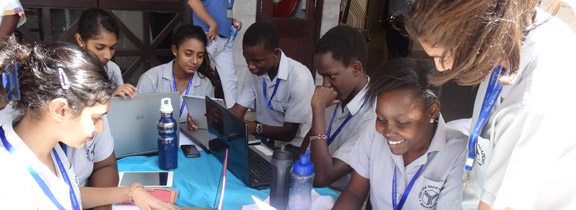
The AKA Learner Profile
The Aga Khan Academies (AKA) have developed a curriculum within the framework of the International Baccalaureate’s (IB) programmes. As such, the attributes of our learner profile are closely aligned to those of the IB learner profile.
Aga Khan Academies learners strive to be:
|
Inquirers |
We nurture our curiosity, developing skills for inquiry and research. We know how to learn independently and with others. We learn with enthusiasm and sustain our love of learning throughout life.
|
|
Knowledgeable
|
We develop and use conceptual understanding, exploring knowledge across a range of disciplines. We engage with issues and ideas that have local and global significance.
|
|
Thinkers |
We use critical and creative thinking skills to analyse and take responsible action on complex problems. We exercise initiative in making reasoned, ethical decisions.
|
|
Communicators
|
We express ourselves confidently and creatively in more than one language and in many ways. We collaborate effectively, listening carefully to the perspectives of other individuals and groups.
|
|
Principled
|
We act with integrity and honesty, with a strong sense of fairness and justice, and with respect for the dignity and rights of people everywhere. We take responsibility for our actions and their consequences.
|
|
Open-minded
|
We critically appreciate our own cultures and personal histories, as well as the values and traditions of others. We seek and evaluate a range of points of view, and we are willing to grow from the experience.
|
|
Caring
|
We show empathy, compassion and respect. We have a commitment to service, and we act to make a positive difference in the lives of others and in the world around us.
|
|
Courageous
|
We approach uncertainty with forethought and determination; we work independently and cooperatively to explore new ideas and innovative strategies. We are resourceful and resilient in the face of challenges and change.
|
|
Balanced |
We understand the importance of balancing different aspects of our lives – intellectual, physical, emotional and spiritual – to achieve well-being for ourselves and others. We recognise our interdependence with other people and with the world in which we live.
|
|
Reflective
|
We thoughtfully consider the world and our own ideas and experience. We work to understand our strengths and weaknesses in order to support our learning and personal development.
|
|
*Leaders |
We understand that multiple perspectives will allow us to make better decisions, and seek opportunities to work with a variety of others. We perceive and anticipate needs and problems, and are able to motivate ourselves and others to tackle problems, confidently and cooperatively.
|
|
*Stewards |
We understand the interconnectedness of communities, striving to create harmony in our environment, while considering the needs of all members. We are motivated to leave the world a better place.
|
© International Baccalaureate 2013
IB learner profile booklet
*Unique attributes of the Aga Khan Academies learner profile
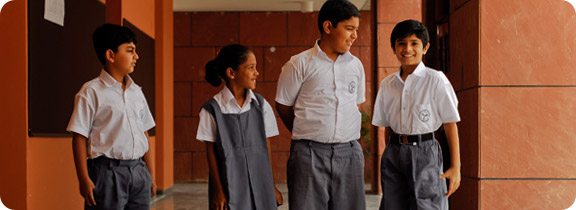
The AKA Learner Profile
The Aga Khan Academies (AKA) have developed a curriculum within the framework of the International Baccalaureate’s (IB) programmes. As such, the attributes of our learner profile are closely aligned to those of the IB learner profile.
Aga Khan Academies learners strive to be:
|
Inquirers |
We nurture our curiosity, developing skills for inquiry and research. We know how to learn independently and with others. We learn with enthusiasm and sustain our love of learning throughout life.
|
|
Knowledgeable
|
We develop and use conceptual understanding, exploring knowledge across a range of disciplines. We engage with issues and ideas that have local and global significance.
|
|
Thinkers |
We use critical and creative thinking skills to analyse and take responsible action on complex problems. We exercise initiative in making reasoned, ethical decisions.
|
|
Communicators
|
We express ourselves confidently and creatively in more than one language and in many ways. We collaborate effectively, listening carefully to the perspectives of other individuals and groups.
|
|
Principled
|
We act with integrity and honesty, with a strong sense of fairness and justice, and with respect for the dignity and rights of people everywhere. We take responsibility for our actions and their consequences.
|
|
Open-minded
|
We critically appreciate our own cultures and personal histories, as well as the values and traditions of others. We seek and evaluate a range of points of view, and we are willing to grow from the experience.
|
|
Caring
|
We show empathy, compassion and respect. We have a commitment to service, and we act to make a positive difference in the lives of others and in the world around us.
|
|
Courageous
|
We approach uncertainty with forethought and determination; we work independently and cooperatively to explore new ideas and innovative strategies. We are resourceful and resilient in the face of challenges and change.
|
|
Balanced |
We understand the importance of balancing different aspects of our lives – intellectual, physical, emotional and spiritual – to achieve well-being for ourselves and others. We recognise our interdependence with other people and with the world in which we live.
|
|
Reflective
|
We thoughtfully consider the world and our own ideas and experience. We work to understand our strengths and weaknesses in order to support our learning and personal development.
|
|
*Leaders |
We understand that multiple perspectives will allow us to make better decisions, and seek opportunities to work with a variety of others. We perceive and anticipate needs and problems, and are able to motivate ourselves and others to tackle problems, confidently and cooperatively.
|
|
*Stewards |
We understand the interconnectedness of communities, striving to create harmony in our environment, while considering the needs of all members. We are motivated to leave the world a better place.
|
© International Baccalaureate 2013
IB learner profile booklet
*Unique attributes of the Aga Khan Academies learner profile

AKA Maputo Parental Questionnaire: July 2020
Dear parents,
Please find a questionnaire below seeking your feedback on the Academy’s re-opening plans. As you will know, the President has recently announced the phased re-opening of public schools. We are, therefore, in the process of considering scenarios for re-opening the Academy.
We seek your feedback on four scenarios available to us currently:
- School re-opening on August 10th as per the calendar with a phased introduction of classes to ensure health and wellness.
- School postponing a phased opening until 1st September 2020 but with online learning taking place from August 10th.
- School re-opening in August with online learning until mid-term in October
- School continues to provide online learning until Jan 2021
Please note that we seek your views in order to help us make the best decision. We know that not everybody will have the same opinion – but we will, along with a representative group of parents, ensure that any scenario places the educational and social well-being of the students at the heart of the decision making process.
Caros Pais e Encarregados de Educação,
Encontrem nesta comunicação um questionário que servirá para obter o vosso feedback sobre os planos de reabertura da Academia. Como devem saber, o Presidente anunciou recentemente a reabertura faseada das escolas públicas. Estamos, portanto, no processo de considerar cenários para a reabertura da Academia.
Temos em análise quatro possíveis cenários:
- Reabertura da escola a 10 de Agosto, de acordo com o calendário, com uma introdução faseada das aulas para garantir a saúde e bem-estar;
- Adiamento da abertura gradual até 1 de Setembro de 2020, mas com aprendizagem on-line a tomar lugar a partir de 10 de Agosto;
- Reabertura da escola em Agosto, com aprendizagem on-line até meados de Outubro.
- A escola continua com aprendizagem on-line até janeiro de 2021
Note que buscamos as vossas opiniões para ajudar-nos a tomar a melhor decisão. Sabemos que nem todos terão a mesma opinião - mas, juntamente com um grupo representativo de pais, garantiremos que qualquer cenário coloque o bem-estar educacional e social dos alunos no centro do processo de tomada de decisão.
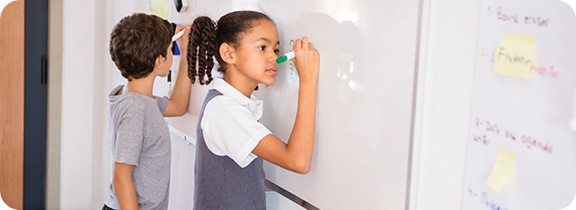
The AKA Learner Profile
The Aga Khan Academies (AKA) have developed a curriculum within the framework of the International Baccalaureate’s (IB) programmes. As such, the attributes of our learner profile are closely aligned to those of the IB learner profile.
Aga Khan Academies learners strive to be:
|
Inquirers |
We nurture our curiosity, developing skills for inquiry and research. We know how to learn independently and with others. We learn with enthusiasm and sustain our love of learning throughout life.
|
|
Knowledgeable
|
We develop and use conceptual understanding, exploring knowledge across a range of disciplines. We engage with issues and ideas that have local and global significance.
|
|
Thinkers |
We use critical and creative thinking skills to analyse and take responsible action on complex problems. We exercise initiative in making reasoned, ethical decisions.
|
|
Communicators
|
We express ourselves confidently and creatively in more than one language and in many ways. We collaborate effectively, listening carefully to the perspectives of other individuals and groups.
|
|
Principled
|
We act with integrity and honesty, with a strong sense of fairness and justice, and with respect for the dignity and rights of people everywhere. We take responsibility for our actions and their consequences.
|
|
Open-minded
|
We critically appreciate our own cultures and personal histories, as well as the values and traditions of others. We seek and evaluate a range of points of view, and we are willing to grow from the experience.
|
|
Caring
|
We show empathy, compassion and respect. We have a commitment to service, and we act to make a positive difference in the lives of others and in the world around us.
|
|
Courageous
|
We approach uncertainty with forethought and determination; we work independently and cooperatively to explore new ideas and innovative strategies. We are resourceful and resilient in the face of challenges and change.
|
|
Balanced |
We understand the importance of balancing different aspects of our lives – intellectual, physical, emotional and spiritual – to achieve well-being for ourselves and others. We recognise our interdependence with other people and with the world in which we live.
|
|
Reflective
|
We thoughtfully consider the world and our own ideas and experience. We work to understand our strengths and weaknesses in order to support our learning and personal development.
|
|
*Leaders |
We understand that multiple perspectives will allow us to make better decisions, and seek opportunities to work with a variety of others. We perceive and anticipate needs and problems, and are able to motivate ourselves and others to tackle problems, confidently and cooperatively.
|
|
*Stewards |
We understand the interconnectedness of communities, striving to create harmony in our environment, while considering the needs of all members. We are motivated to leave the world a better place.
|
© International Baccalaureate 2013
IB learner profile booklet
*Unique attributes of the Aga Khan Academies learner profile
Aleesha Suleman (Class of 2012): Dedicated and determined
At UCL- Qatar, Aleesha is completing a Master of Arts Degree programme in Museum and Gallery Practice. This programme, Aleesha says, “brings together my many loves – art, museums, culture, education, development and social justice.”
Aleesha also has a Bachelor of Science degree in Foreign Service from Georgetown University in Qatar. She notes that whenever she was studying, she never lost sight of her connection to Kenya.
“For one, whatever classes I took, I would find ways to connect my research back to Kenya, its history, its politics and its socio-economic issues. University classes related to the African continent would light a spark in me that made me realise how passionate I was about making a positive social change to the continent in whatever way I could,” she states.
Being admitted to the Academy was the beginning of a transformative journey for Aleesha. Coming from a more conservative background, it was a culture jolt initially. “I distinctly remember feeling the shock of a co-ed classroom for the first time and feeling like I would never be comfortable in the Academy’s school uniform.”
However, as Aleesha began to be exposed to a plethora of experiences, she adjusted quickly to her new life. She engaged in a number of extracurricular activities, including singing and playing musical instruments for the school band, hiking and mountain climbing through the President’s Award Programme. She also took on a leadership role within the growing residential programme as a Dorm Captain.
Following her graduation from Georgetown University, Aleesha returned to AKA Mombasa to become an Academy Fellow for two years. During this time, Aleesha worked as a mentor and residential parent to students, while also working in the Communications Department. Once her fellowship ended, Aleesha became the Communication Department’s official Communications Officer.Always a champion of social enterprise and progress, Aleesha started an organisation called Kreatives Konnect when she became a part of the Academy staff. The focus of the organisation is to provide opportunities for creatives in the coastal city of Mombasa to showcase their talents, network and collaborate with others, while also co-creating opportunities for development. Not only did the staff at the school back her in this endeavour, but the Academy students and the wider AKA community also helped her make this vision a reality.
“It made me feel very privileged to be part of such a community,” Aleesha recalls proudly. “I realised that just as the Academy supports students in making their ideas come to life, the school also supports all projects that impact the broader society.”
What does Aleesha envision she will do for Kenya?
“My long-term goal is to build high quality, accessible creative spaces in Kenya, specifically in my hometown of Mombasa. I hope to establish start-ups around this idea, incorporating the ground-work already started through Kreatives Konnect.”
A firm believer in the power of good art bringing about social change and moving communities forward, Aleesha says her goal is to work with artists to raise the level of development of the country in a sustainable manner. “I would like to work on creating cultural policy and instituting cross-cultural collaborative programs that would revolutionise the creative industry, not just at a local level in Mombasa, Kenya, but also at a regional and international scale.”
Aleesha recently worked on an interactive online exhibition with her Museum and Gallery Practice colleagues. It is titled Umoumah: Becoming a Mother and takes the visitor on a journey through pregnancy and motherhood, especially focusing on how the mother can be supported by loved ones and most importantly, herself. Aleesha sees this project as a crucial learning experience in how support and positive social change can be achieved through digital platforms. “Especially now with COVID-19, we’re all having to find alternative ways of communicating and connecting with others, and having a fully online exhibition is simply a testament to that. It opens up a lot more cross-border avenues for the future that transcend physical constraints.”Aleesha has fondly come to regard the Academy as her second home. Reminiscing about her period at the Academy, she offers a bit of advice to current Academy students.
“Be highly proactive. Do your research. Learn about yourself. Keep your options open and stop letting other people define the next steps of your life. Don’t be lazy about this process because it defines the next few years of your life. No one is going to just hand you things – you have to work for it. There are lots of amazing young people around the world who are deserving (especially if you’re looking for scholarships) You have to show the admissions team why you are unique, but there has to be evidence to show this. This evidence comes through your active and consistent participation in the activities and causes you truly care about.”Khushboo Khoja (Class of 2016): Giving back to communities
“My experience at the Academy was very significant as it made me realise that I am interested in working with social issues and helping communities,” reflects Khushboo Khoja, a 2016 graduate from the Aga Khan Academy Hyderabad.
Her passion for helping others, which was sparked through service learning initiatives she participated in at the Academy, is something Khushboo has taken with her to university. She is currently enrolled in the Faculty of Social Science at the University of Western Ontario in Canada, and recently completed her first year of post-secondary education. As a recipient of a tuition waiver through the Aga Khan Academies–Ontario tuition waiver programme, Khushboo is thankful for the opportunity to attend a university in Canada: “When I found out that I got the scholarship, it was a very grateful moment because it would change my whole life. The fact that I am able to get an education of this kind in Canada helps me build my future and enhances my entire quality of life.”
During her time at the Aga Khan Academy, Khushboo was able to help others improve their quality of life by volunteering at a government school for four years teaching English and math: “I always looked forward to finishing class and going there because those girls were so inspiring. Most of the girls didn’t come from as privileged backgrounds and didn’t have everything they needed, but were so happy and always so motivated and satisfied with everything they had.”
Khushboo continued this work through a summer internship in a village in India, where she learned more about the importance of education and awareness regarding sanitation and immunization: “While engaging with the community of the village and learning about their health and hygienic needs, we conducted school plays to spread awareness about the importance of healthy alcohol-free and tobacco-free lives. The special bond that I built with the people of the village motivates and inspires me to keep learning from the diverse communities I am surrounded with and making significant contributions in whatever ways I can. I am glad to have been opened to a new perspective in which a place does not necessarily have to be changed but has to first be accepted and appreciated.”
Khushboo attributes her ability to take her classroom learning and put it into practice to her time at the Academy: “I feel like my experience at the Academy allowed me to perceive in a more holistic and practical way. The experience was not just about what we were reading in books or learning, but also about incorporating values and ethics in our daily lives and applying our knowledge to better ourselves and the community. The integrated learning experience helped me learn how to learn, which I now carry with me wherever I go and whenever I am learning.”
During her short time in Canada, Khushboo has already begun making a difference in the community around her. Her volunteer activities include helping at the Merrymount Family Support and Crisis Centre, where she assists with counselling parents and children who are in crisis and/or experiencing times of transition. She was also elected to the executive team for the Ismaili Students Association as the ‘frosh representative’ where she has the opportunity to organise educational and social events for the members of the association: “I am the representative for the first-year students. I enjoy meeting new people from different cultures yet from the same community - the beautiful blend makes me appreciate the pluralistic atmosphere that’s created.”
She has also successfully applied for a leadership position on campus as a residence advisor where one of her primary roles will be to foster a community atmosphere in the residence. When not busy studying or volunteering, Khushboo also plays indoor soccer on the intramural team at Western.
One of Khushboo’s passions is working with women and children, promoting health and education. For Khushboo, going back to India and continuing this work is incredibly important: “I want to bring awareness and enrich the accessibility of resources. Sometimes it’s not about changing things but rather bringing a new perspective to people that may help them. Depending on the context, approaches to the occurring difficulties of people have to be altered, with broadening horizons.”
By Karina Hussein
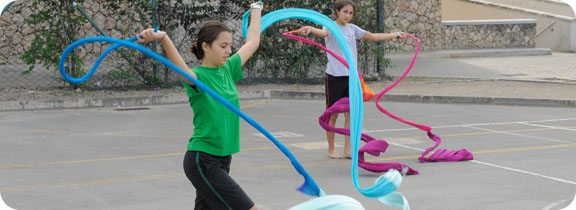
Aga Khan Curricular Strands
The Aga Khan Curricular Strands (AK Strands) are a unique part of the programme offered by the Aga Khan Academies. The AK Strands are areas of learning aimed specifically at developing knowledge, skills and attitudes required by future leaders.
Our goal at the Academies is to develop young people who have strong local roots and are also globally minded. They should be able to become leaders in whichever fields they choose.
To help achieve this goal, we have identified five areas of learning, the Aga Khan Curricular Strands, that we believe are important for our students. These are:
- Ethics
- Pluralism
- Cultures (with an emphasis on Muslim civilisations)
- Governance and Civil Society
- Economics for Development
Implementing the AK Strands
The Aga Khan Curricular Strands are not taught as independent subjects. Instead, we weave them into the existing subject areas of the academic curriculum. They help inform the selection of content and themes for study. The AK Strands also provide direction for school life outside the classroom in areas such as policy making, recruitment, student life and residential life.
Two of the AK Strands, Ethics and Pluralism, help students develop values and dispositions required by ethical leaders. Our students learn about these areas in theory and are also encouraged to practice what they learn in their everyday lives.
Through the other three AK Strands, our students learn about ideas that are important to the functioning of societies. In particular, they learn about how these ideas impact people’s lives in countries of the developing world. The knowledge they gain helps them understand key issues from both local and international perspectives.
The AK Strands in practice
The Aga Khan Curricular Strands have been developed and tested over several years at the Aga Khan Academy Mombasa. This has led to new ideas and creative methods of teaching.
For example, teachers in different departments are using the AK Strands to collaborate in interesting ways. In one project, year 7 students worked on a unit that related to Governance and Civil Society in both humanities and English. They linked their theoretical understanding of authority structures to their study of the novel, The Giver.
They looked at questions of governance, freedom of choice, security and related ethical questions through the lenses of both subject areas. This allowed for a unique learning experience that was both broad and deep.
Through the Aga Khan Curricular Strands, our students develop attitudes and values that will help them throughout their lives. They also gain knowledge and understanding that will allow them to contribute positively to their societies in the future.
For more information on the educational programme offered at the Aga Khan Academy Mombasa please visit the Academic Programme page.


